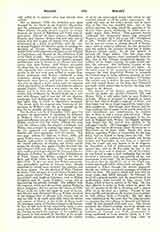

Wolowski, LOUIS-FRANCOIS-MICHEL-REYMOND, economist, b. at Warsaw, August 31, 1810; d. at Gisors, Eure, August 15, 1876. His father, a member of the provisory government which established the Polish Revolution at Warsaw in 1830, sent him to Paris despite his youth as first secretary of legation. When the revolution was quelled, the Wolowski family established themselves at Paris, and in 1836 Louis was a naturalized Frenchman. His creation, as early as 1834, of the “Revue de legislation et de jurisprudence” began to assure his reputation as jurist and economist; in 1839 a chair of industrial legislation was created for him at the Conservatory of Arts and Crafts, which he occupied for thirty-two years. In 1855 he became a member of the Academie des Sciences Morales et Politiques. On two occasions Wolowski played a legislative role. Elected representative of the Seine at the Constituent Assembly in 1848 and at the Legislative Assembly in 1849, he directed (May 10, 1848) the attention of the Government to the misfortunes of Poland, and voted for the expedition to Rome and the Loi Falloux. Elected in 1871 representative to the National Assembly, he sat on the Left center and played a very important part in the financial discussions; in December, 1875, he became senator for life. He played an important part in the foundation of the Credit Foncier, whose principal object was the withdrawal of rural property from the expenses of loans and the scourge of hypothecary subrogation. A bimetallist in monetary matters and a free trader in commercial matters, he did not carry economic liberalism so far as to oppose all State intervention in the matter of labor; on the contrary, he had a very important share in the law of May 19, 1871, which limited the labor of children and women in manufacturing, and which created division inspectors for the supervision of labor. “Wolowski”, says M. Jules Rambaud, who studied his work at length, “was animated by sincere piety, concerning which we should not be misled by some epigrams on the ancient economic privileges enjoyed by the clergy.”
Among Wolowski’s works were: “Des societes par actions” (1838); “Des brevets d’invention et des marques de fabrique” (1840); “De l’organisation du travail” (1844); “Etudes d’economie politique et de statistique” (1848); “La banque d’Angleterre et les banques d’Ecosse” (1867); “L’or et l’argent” (1870). He published (1856) a translation of Roscher’s “Principles of Political Economy”.
GEORGES GOYAU

